Professional Development Needs Analysis
VerifiedAdded on 2020/07/23
|18
|4525
|39
AI Summary
This assignment is designed to help students understand the importance of analyzing professional development needs in different contexts. By examining case studies from various fields such as education, healthcare, and more, students will be able to identify competences, assess the impact of global health volunteers, and understand how professional development can enhance knowledge and skills. The analysis will provide valuable insights into the effectiveness of professional development initiatives and help students develop a deeper understanding of the subject matter.
Contribute Materials
Your contribution can guide someone’s learning journey. Share your
documents today.
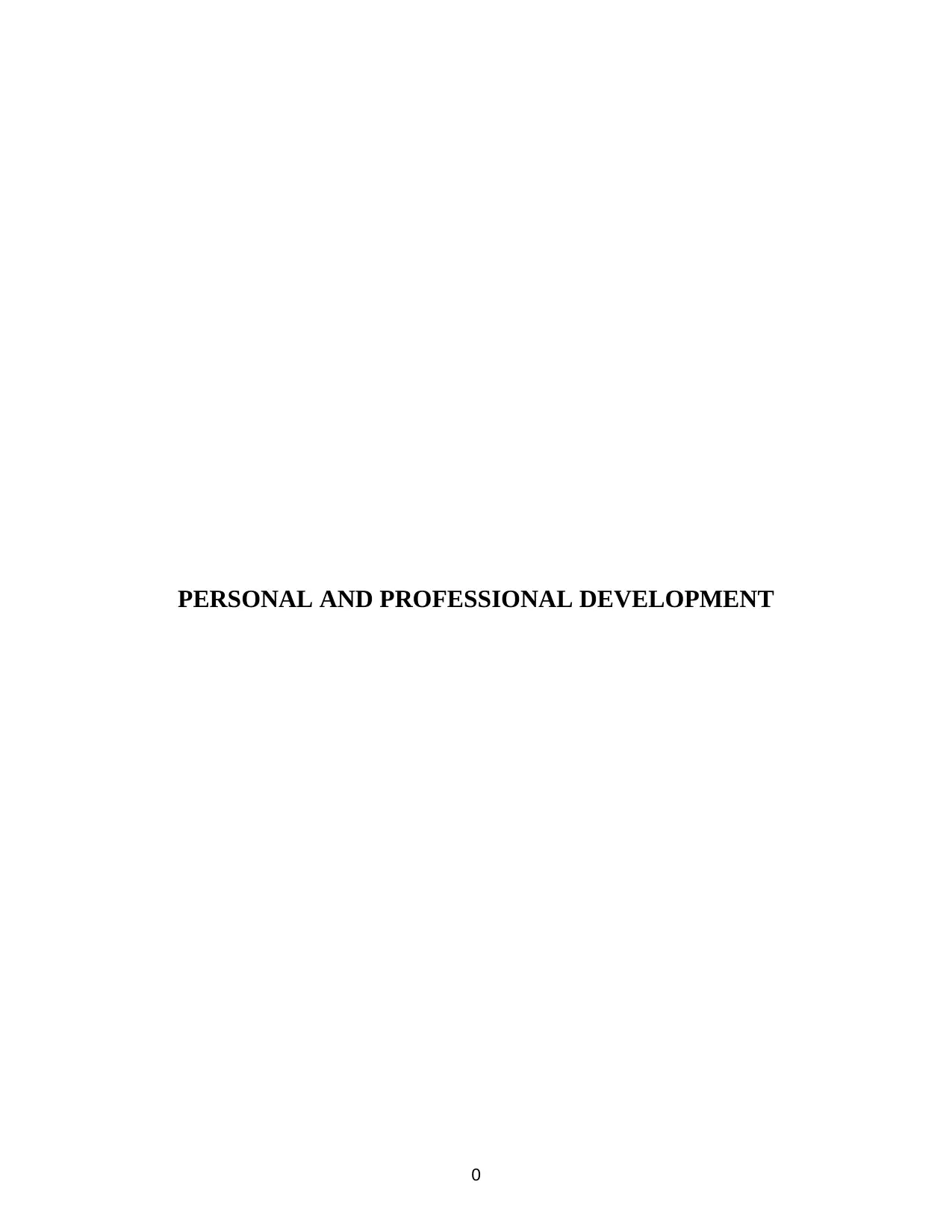
PERSONAL AND PROFESSIONAL DEVELOPMENT
0
0
Secure Best Marks with AI Grader
Need help grading? Try our AI Grader for instant feedback on your assignments.
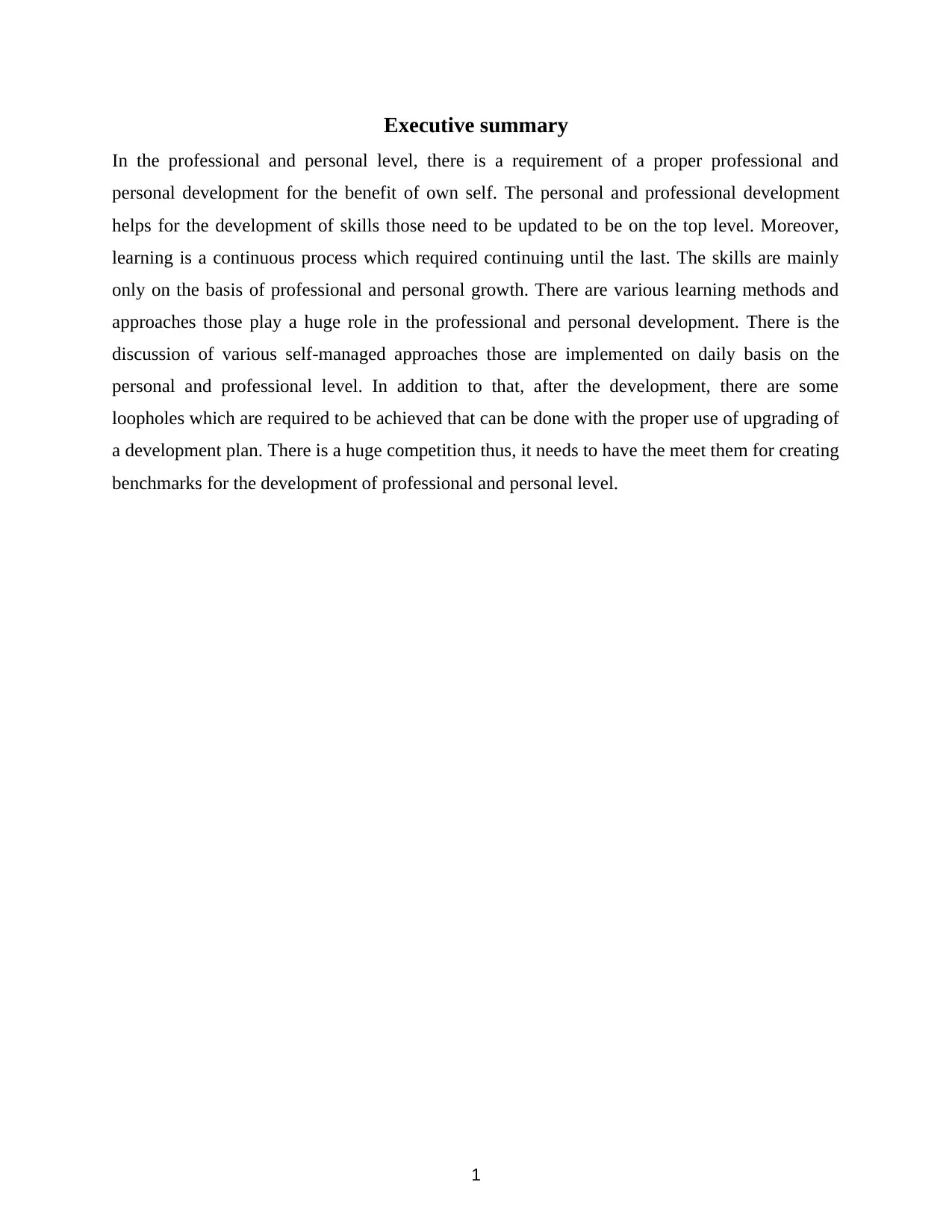
Executive summary
In the professional and personal level, there is a requirement of a proper professional and
personal development for the benefit of own self. The personal and professional development
helps for the development of skills those need to be updated to be on the top level. Moreover,
learning is a continuous process which required continuing until the last. The skills are mainly
only on the basis of professional and personal growth. There are various learning methods and
approaches those play a huge role in the professional and personal development. There is the
discussion of various self-managed approaches those are implemented on daily basis on the
personal and professional level. In addition to that, after the development, there are some
loopholes which are required to be achieved that can be done with the proper use of upgrading of
a development plan. There is a huge competition thus, it needs to have the meet them for creating
benchmarks for the development of professional and personal level.
1
In the professional and personal level, there is a requirement of a proper professional and
personal development for the benefit of own self. The personal and professional development
helps for the development of skills those need to be updated to be on the top level. Moreover,
learning is a continuous process which required continuing until the last. The skills are mainly
only on the basis of professional and personal growth. There are various learning methods and
approaches those play a huge role in the professional and personal development. There is the
discussion of various self-managed approaches those are implemented on daily basis on the
personal and professional level. In addition to that, after the development, there are some
loopholes which are required to be achieved that can be done with the proper use of upgrading of
a development plan. There is a huge competition thus, it needs to have the meet them for creating
benchmarks for the development of professional and personal level.
1
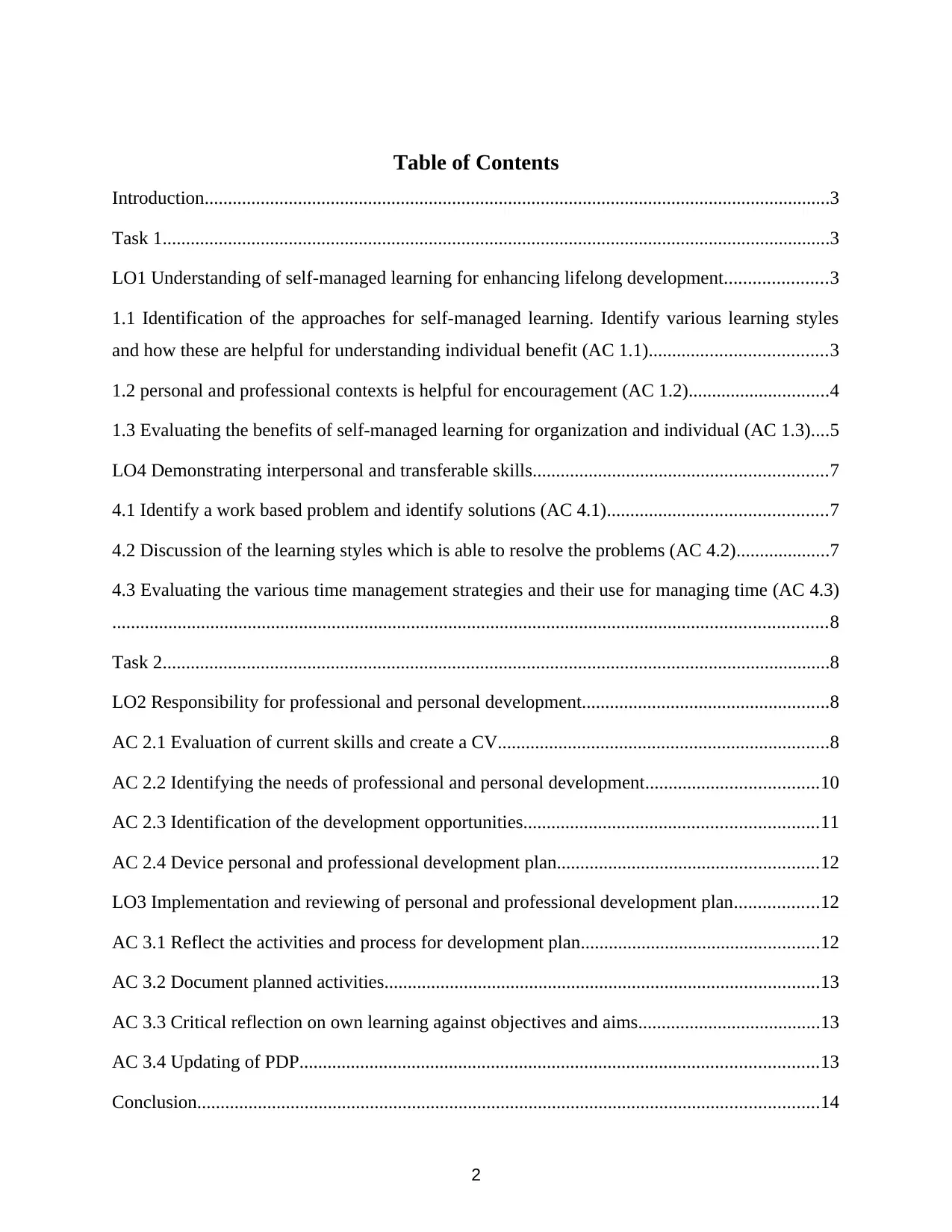
Table of Contents
Introduction......................................................................................................................................3
Task 1...............................................................................................................................................3
LO1 Understanding of self-managed learning for enhancing lifelong development......................3
1.1 Identification of the approaches for self-managed learning. Identify various learning styles
and how these are helpful for understanding individual benefit (AC 1.1)......................................3
1.2 personal and professional contexts is helpful for encouragement (AC 1.2)..............................4
1.3 Evaluating the benefits of self-managed learning for organization and individual (AC 1.3)....5
LO4 Demonstrating interpersonal and transferable skills...............................................................7
4.1 Identify a work based problem and identify solutions (AC 4.1)...............................................7
4.2 Discussion of the learning styles which is able to resolve the problems (AC 4.2)....................7
4.3 Evaluating the various time management strategies and their use for managing time (AC 4.3)
.........................................................................................................................................................8
Task 2...............................................................................................................................................8
LO2 Responsibility for professional and personal development.....................................................8
AC 2.1 Evaluation of current skills and create a CV.......................................................................8
AC 2.2 Identifying the needs of professional and personal development.....................................10
AC 2.3 Identification of the development opportunities...............................................................11
AC 2.4 Device personal and professional development plan........................................................12
LO3 Implementation and reviewing of personal and professional development plan..................12
AC 3.1 Reflect the activities and process for development plan...................................................12
AC 3.2 Document planned activities.............................................................................................13
AC 3.3 Critical reflection on own learning against objectives and aims.......................................13
AC 3.4 Updating of PDP...............................................................................................................13
Conclusion.....................................................................................................................................14
2
Introduction......................................................................................................................................3
Task 1...............................................................................................................................................3
LO1 Understanding of self-managed learning for enhancing lifelong development......................3
1.1 Identification of the approaches for self-managed learning. Identify various learning styles
and how these are helpful for understanding individual benefit (AC 1.1)......................................3
1.2 personal and professional contexts is helpful for encouragement (AC 1.2)..............................4
1.3 Evaluating the benefits of self-managed learning for organization and individual (AC 1.3)....5
LO4 Demonstrating interpersonal and transferable skills...............................................................7
4.1 Identify a work based problem and identify solutions (AC 4.1)...............................................7
4.2 Discussion of the learning styles which is able to resolve the problems (AC 4.2)....................7
4.3 Evaluating the various time management strategies and their use for managing time (AC 4.3)
.........................................................................................................................................................8
Task 2...............................................................................................................................................8
LO2 Responsibility for professional and personal development.....................................................8
AC 2.1 Evaluation of current skills and create a CV.......................................................................8
AC 2.2 Identifying the needs of professional and personal development.....................................10
AC 2.3 Identification of the development opportunities...............................................................11
AC 2.4 Device personal and professional development plan........................................................12
LO3 Implementation and reviewing of personal and professional development plan..................12
AC 3.1 Reflect the activities and process for development plan...................................................12
AC 3.2 Document planned activities.............................................................................................13
AC 3.3 Critical reflection on own learning against objectives and aims.......................................13
AC 3.4 Updating of PDP...............................................................................................................13
Conclusion.....................................................................................................................................14
2

Reference list.................................................................................................................................15
3
3
Secure Best Marks with AI Grader
Need help grading? Try our AI Grader for instant feedback on your assignments.
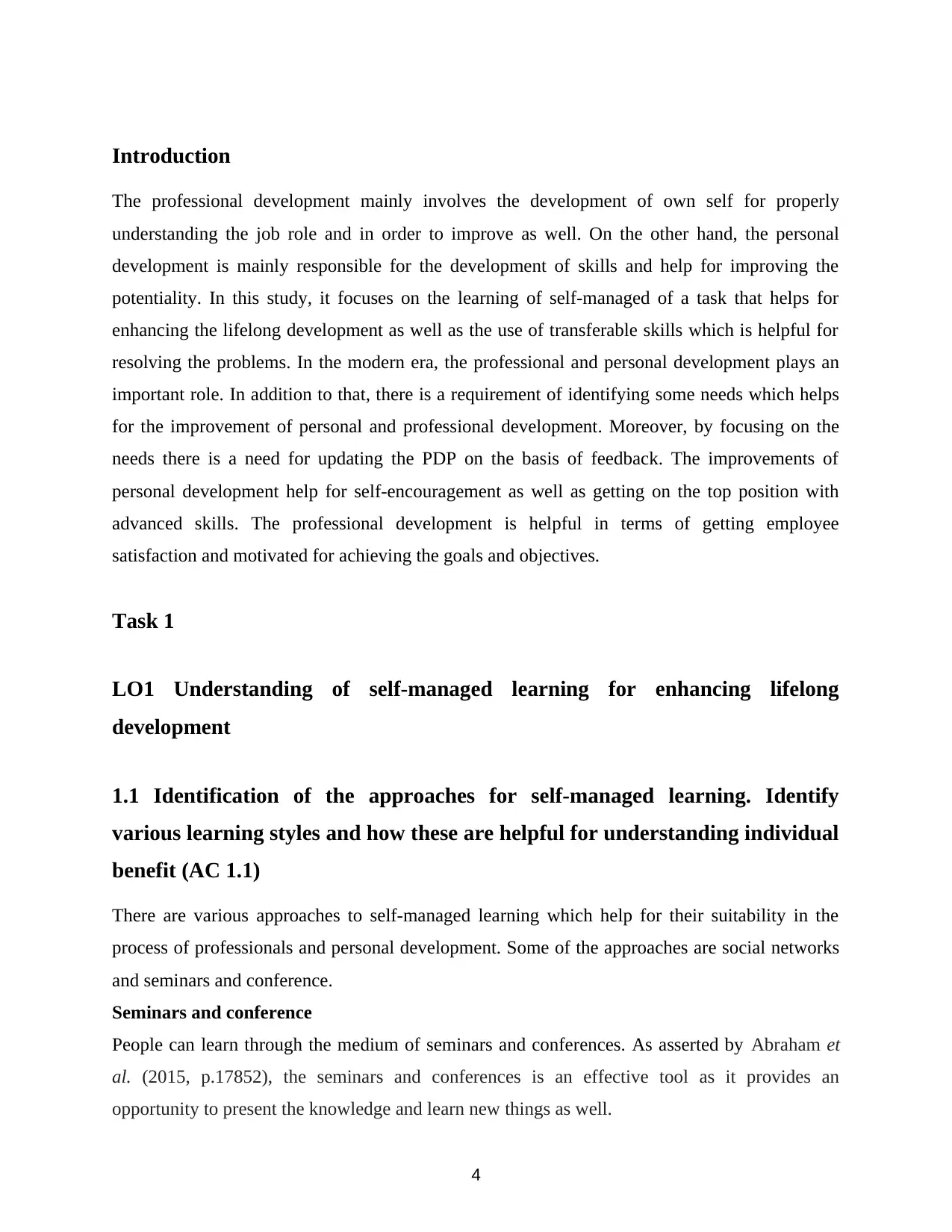
Introduction
The professional development mainly involves the development of own self for properly
understanding the job role and in order to improve as well. On the other hand, the personal
development is mainly responsible for the development of skills and help for improving the
potentiality. In this study, it focuses on the learning of self-managed of a task that helps for
enhancing the lifelong development as well as the use of transferable skills which is helpful for
resolving the problems. In the modern era, the professional and personal development plays an
important role. In addition to that, there is a requirement of identifying some needs which helps
for the improvement of personal and professional development. Moreover, by focusing on the
needs there is a need for updating the PDP on the basis of feedback. The improvements of
personal development help for self-encouragement as well as getting on the top position with
advanced skills. The professional development is helpful in terms of getting employee
satisfaction and motivated for achieving the goals and objectives.
Task 1
LO1 Understanding of self-managed learning for enhancing lifelong
development
1.1 Identification of the approaches for self-managed learning. Identify
various learning styles and how these are helpful for understanding individual
benefit (AC 1.1)
There are various approaches to self-managed learning which help for their suitability in the
process of professionals and personal development. Some of the approaches are social networks
and seminars and conference.
Seminars and conference
People can learn through the medium of seminars and conferences. As asserted by Abraham et
al. (2015, p.17852), the seminars and conferences is an effective tool as it provides an
opportunity to present the knowledge and learn new things as well.
4
The professional development mainly involves the development of own self for properly
understanding the job role and in order to improve as well. On the other hand, the personal
development is mainly responsible for the development of skills and help for improving the
potentiality. In this study, it focuses on the learning of self-managed of a task that helps for
enhancing the lifelong development as well as the use of transferable skills which is helpful for
resolving the problems. In the modern era, the professional and personal development plays an
important role. In addition to that, there is a requirement of identifying some needs which helps
for the improvement of personal and professional development. Moreover, by focusing on the
needs there is a need for updating the PDP on the basis of feedback. The improvements of
personal development help for self-encouragement as well as getting on the top position with
advanced skills. The professional development is helpful in terms of getting employee
satisfaction and motivated for achieving the goals and objectives.
Task 1
LO1 Understanding of self-managed learning for enhancing lifelong
development
1.1 Identification of the approaches for self-managed learning. Identify
various learning styles and how these are helpful for understanding individual
benefit (AC 1.1)
There are various approaches to self-managed learning which help for their suitability in the
process of professionals and personal development. Some of the approaches are social networks
and seminars and conference.
Seminars and conference
People can learn through the medium of seminars and conferences. As asserted by Abraham et
al. (2015, p.17852), the seminars and conferences is an effective tool as it provides an
opportunity to present the knowledge and learn new things as well.
4
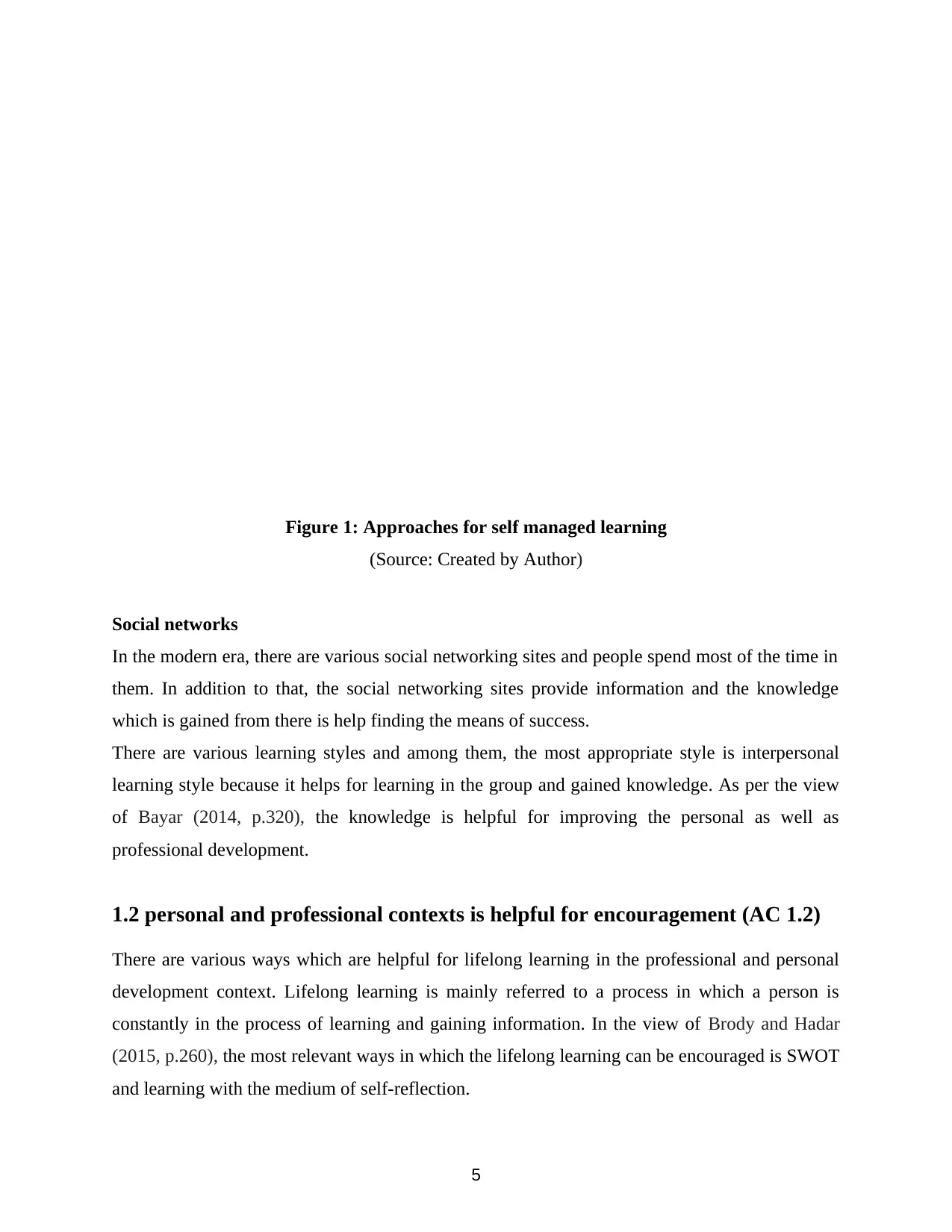
Figure 1: Approaches for self managed learning
(Source: Created by Author)
Social networks
In the modern era, there are various social networking sites and people spend most of the time in
them. In addition to that, the social networking sites provide information and the knowledge
which is gained from there is help finding the means of success.
There are various learning styles and among them, the most appropriate style is interpersonal
learning style because it helps for learning in the group and gained knowledge. As per the view
of Bayar (2014, p.320), the knowledge is helpful for improving the personal as well as
professional development.
1.2 personal and professional contexts is helpful for encouragement (AC 1.2)
There are various ways which are helpful for lifelong learning in the professional and personal
development context. Lifelong learning is mainly referred to a process in which a person is
constantly in the process of learning and gaining information. In the view of Brody and Hadar
(2015, p.260), the most relevant ways in which the lifelong learning can be encouraged is SWOT
and learning with the medium of self-reflection.
5
(Source: Created by Author)
Social networks
In the modern era, there are various social networking sites and people spend most of the time in
them. In addition to that, the social networking sites provide information and the knowledge
which is gained from there is help finding the means of success.
There are various learning styles and among them, the most appropriate style is interpersonal
learning style because it helps for learning in the group and gained knowledge. As per the view
of Bayar (2014, p.320), the knowledge is helpful for improving the personal as well as
professional development.
1.2 personal and professional contexts is helpful for encouragement (AC 1.2)
There are various ways which are helpful for lifelong learning in the professional and personal
development context. Lifelong learning is mainly referred to a process in which a person is
constantly in the process of learning and gaining information. In the view of Brody and Hadar
(2015, p.260), the most relevant ways in which the lifelong learning can be encouraged is SWOT
and learning with the medium of self-reflection.
5
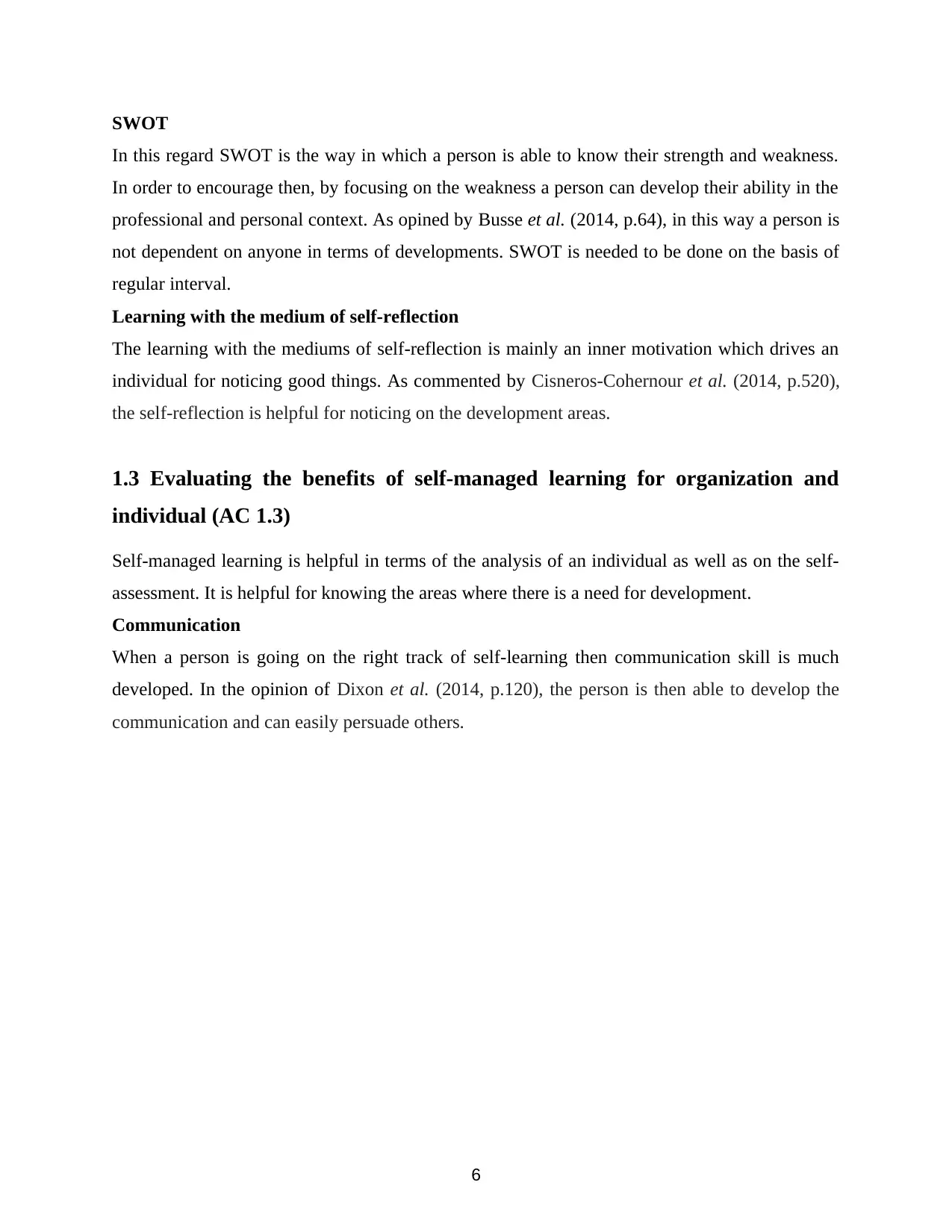
SWOT
In this regard SWOT is the way in which a person is able to know their strength and weakness.
In order to encourage then, by focusing on the weakness a person can develop their ability in the
professional and personal context. As opined by Busse et al. (2014, p.64), in this way a person is
not dependent on anyone in terms of developments. SWOT is needed to be done on the basis of
regular interval.
Learning with the medium of self-reflection
The learning with the mediums of self-reflection is mainly an inner motivation which drives an
individual for noticing good things. As commented by Cisneros-Cohernour et al. (2014, p.520),
the self-reflection is helpful for noticing on the development areas.
1.3 Evaluating the benefits of self-managed learning for organization and
individual (AC 1.3)
Self-managed learning is helpful in terms of the analysis of an individual as well as on the self-
assessment. It is helpful for knowing the areas where there is a need for development.
Communication
When a person is going on the right track of self-learning then communication skill is much
developed. In the opinion of Dixon et al. (2014, p.120), the person is then able to develop the
communication and can easily persuade others.
6
In this regard SWOT is the way in which a person is able to know their strength and weakness.
In order to encourage then, by focusing on the weakness a person can develop their ability in the
professional and personal context. As opined by Busse et al. (2014, p.64), in this way a person is
not dependent on anyone in terms of developments. SWOT is needed to be done on the basis of
regular interval.
Learning with the medium of self-reflection
The learning with the mediums of self-reflection is mainly an inner motivation which drives an
individual for noticing good things. As commented by Cisneros-Cohernour et al. (2014, p.520),
the self-reflection is helpful for noticing on the development areas.
1.3 Evaluating the benefits of self-managed learning for organization and
individual (AC 1.3)
Self-managed learning is helpful in terms of the analysis of an individual as well as on the self-
assessment. It is helpful for knowing the areas where there is a need for development.
Communication
When a person is going on the right track of self-learning then communication skill is much
developed. In the opinion of Dixon et al. (2014, p.120), the person is then able to develop the
communication and can easily persuade others.
6
Paraphrase This Document
Need a fresh take? Get an instant paraphrase of this document with our AI Paraphraser
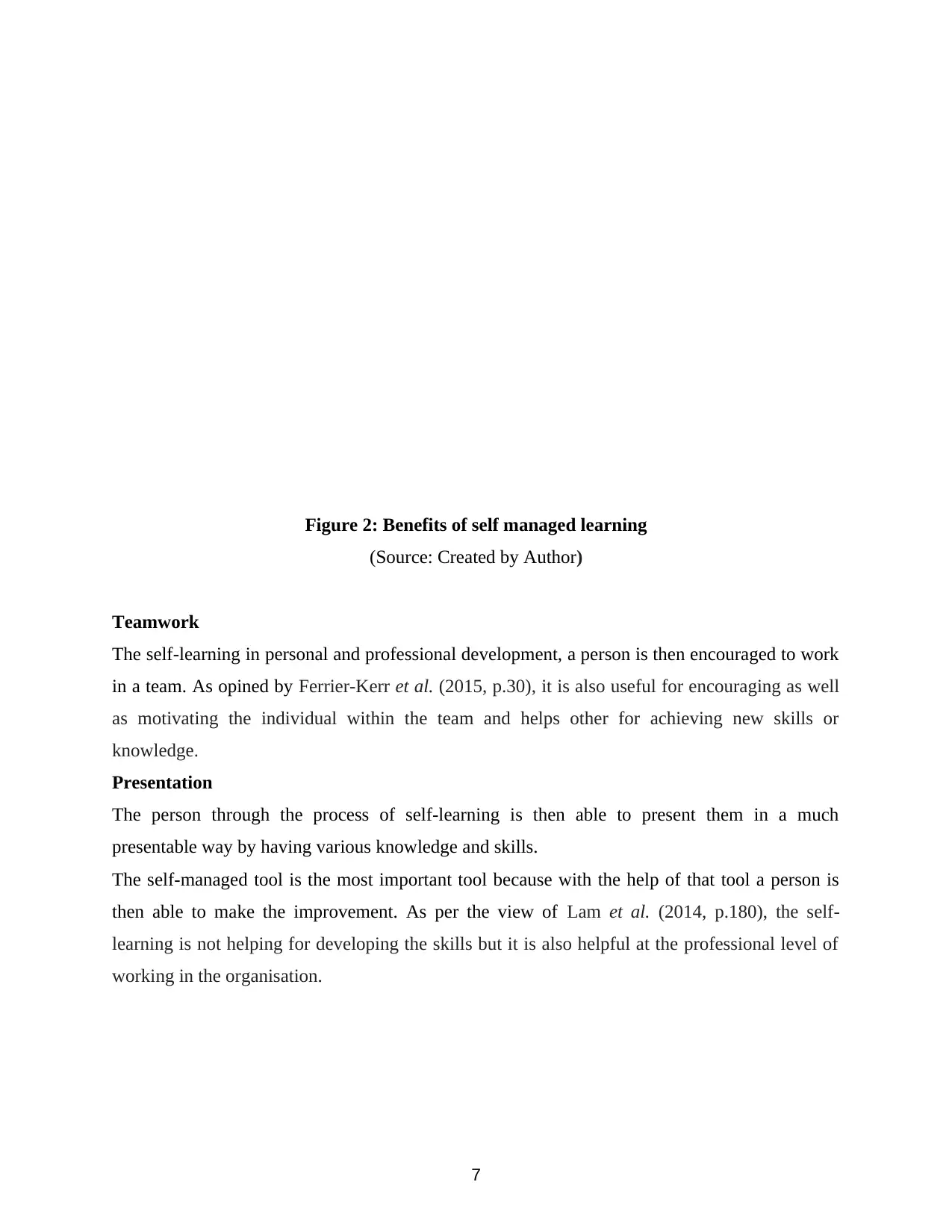
Figure 2: Benefits of self managed learning
(Source: Created by Author)
Teamwork
The self-learning in personal and professional development, a person is then encouraged to work
in a team. As opined by Ferrier-Kerr et al. (2015, p.30), it is also useful for encouraging as well
as motivating the individual within the team and helps other for achieving new skills or
knowledge.
Presentation
The person through the process of self-learning is then able to present them in a much
presentable way by having various knowledge and skills.
The self-managed tool is the most important tool because with the help of that tool a person is
then able to make the improvement. As per the view of Lam et al. (2014, p.180), the self-
learning is not helping for developing the skills but it is also helpful at the professional level of
working in the organisation.
7
(Source: Created by Author)
Teamwork
The self-learning in personal and professional development, a person is then encouraged to work
in a team. As opined by Ferrier-Kerr et al. (2015, p.30), it is also useful for encouraging as well
as motivating the individual within the team and helps other for achieving new skills or
knowledge.
Presentation
The person through the process of self-learning is then able to present them in a much
presentable way by having various knowledge and skills.
The self-managed tool is the most important tool because with the help of that tool a person is
then able to make the improvement. As per the view of Lam et al. (2014, p.180), the self-
learning is not helping for developing the skills but it is also helpful at the professional level of
working in the organisation.
7
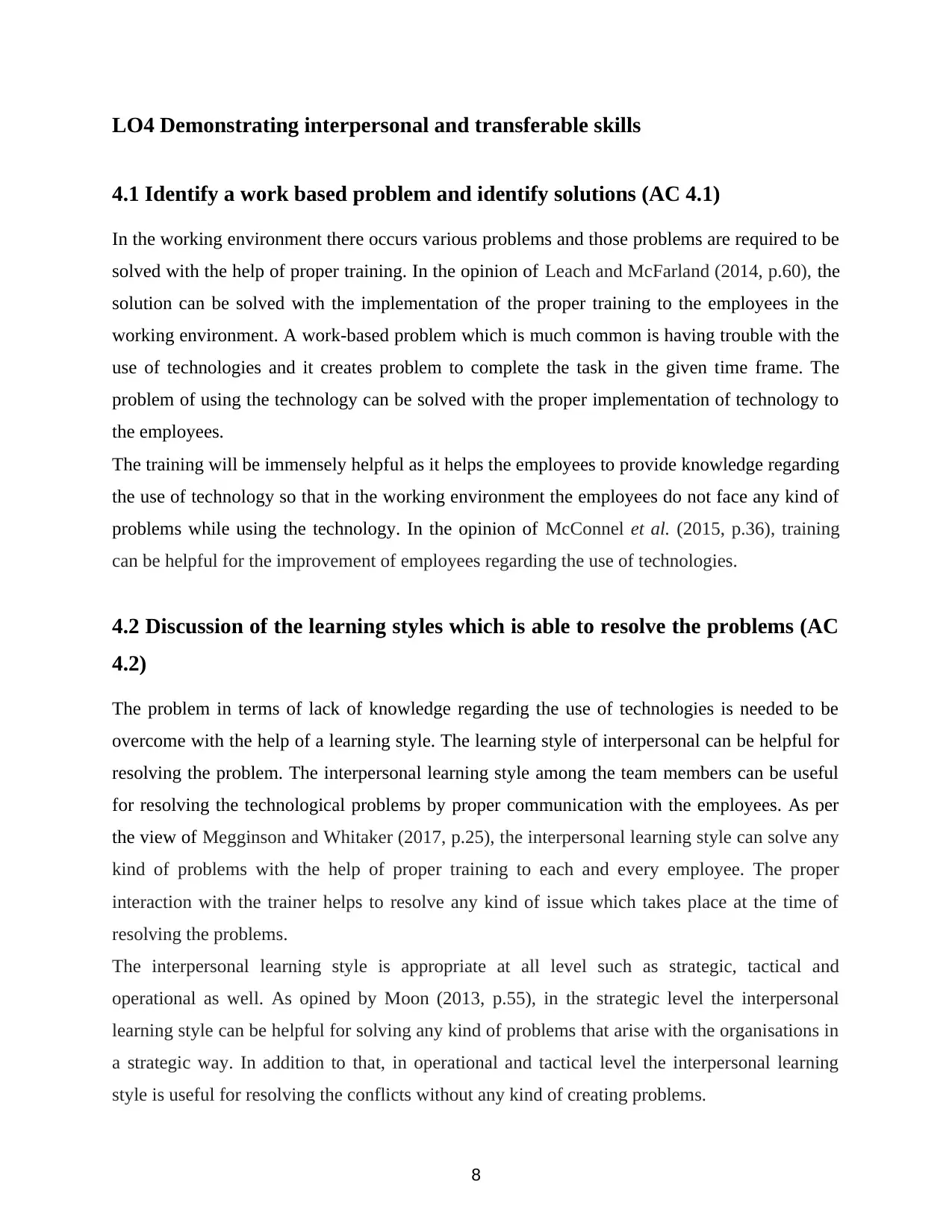
LO4 Demonstrating interpersonal and transferable skills
4.1 Identify a work based problem and identify solutions (AC 4.1)
In the working environment there occurs various problems and those problems are required to be
solved with the help of proper training. In the opinion of Leach and McFarland (2014, p.60), the
solution can be solved with the implementation of the proper training to the employees in the
working environment. A work-based problem which is much common is having trouble with the
use of technologies and it creates problem to complete the task in the given time frame. The
problem of using the technology can be solved with the proper implementation of technology to
the employees.
The training will be immensely helpful as it helps the employees to provide knowledge regarding
the use of technology so that in the working environment the employees do not face any kind of
problems while using the technology. In the opinion of McConnel et al. (2015, p.36), training
can be helpful for the improvement of employees regarding the use of technologies.
4.2 Discussion of the learning styles which is able to resolve the problems (AC
4.2)
The problem in terms of lack of knowledge regarding the use of technologies is needed to be
overcome with the help of a learning style. The learning style of interpersonal can be helpful for
resolving the problem. The interpersonal learning style among the team members can be useful
for resolving the technological problems by proper communication with the employees. As per
the view of Megginson and Whitaker (2017, p.25), the interpersonal learning style can solve any
kind of problems with the help of proper training to each and every employee. The proper
interaction with the trainer helps to resolve any kind of issue which takes place at the time of
resolving the problems.
The interpersonal learning style is appropriate at all level such as strategic, tactical and
operational as well. As opined by Moon (2013, p.55), in the strategic level the interpersonal
learning style can be helpful for solving any kind of problems that arise with the organisations in
a strategic way. In addition to that, in operational and tactical level the interpersonal learning
style is useful for resolving the conflicts without any kind of creating problems.
8
4.1 Identify a work based problem and identify solutions (AC 4.1)
In the working environment there occurs various problems and those problems are required to be
solved with the help of proper training. In the opinion of Leach and McFarland (2014, p.60), the
solution can be solved with the implementation of the proper training to the employees in the
working environment. A work-based problem which is much common is having trouble with the
use of technologies and it creates problem to complete the task in the given time frame. The
problem of using the technology can be solved with the proper implementation of technology to
the employees.
The training will be immensely helpful as it helps the employees to provide knowledge regarding
the use of technology so that in the working environment the employees do not face any kind of
problems while using the technology. In the opinion of McConnel et al. (2015, p.36), training
can be helpful for the improvement of employees regarding the use of technologies.
4.2 Discussion of the learning styles which is able to resolve the problems (AC
4.2)
The problem in terms of lack of knowledge regarding the use of technologies is needed to be
overcome with the help of a learning style. The learning style of interpersonal can be helpful for
resolving the problem. The interpersonal learning style among the team members can be useful
for resolving the technological problems by proper communication with the employees. As per
the view of Megginson and Whitaker (2017, p.25), the interpersonal learning style can solve any
kind of problems with the help of proper training to each and every employee. The proper
interaction with the trainer helps to resolve any kind of issue which takes place at the time of
resolving the problems.
The interpersonal learning style is appropriate at all level such as strategic, tactical and
operational as well. As opined by Moon (2013, p.55), in the strategic level the interpersonal
learning style can be helpful for solving any kind of problems that arise with the organisations in
a strategic way. In addition to that, in operational and tactical level the interpersonal learning
style is useful for resolving the conflicts without any kind of creating problems.
8
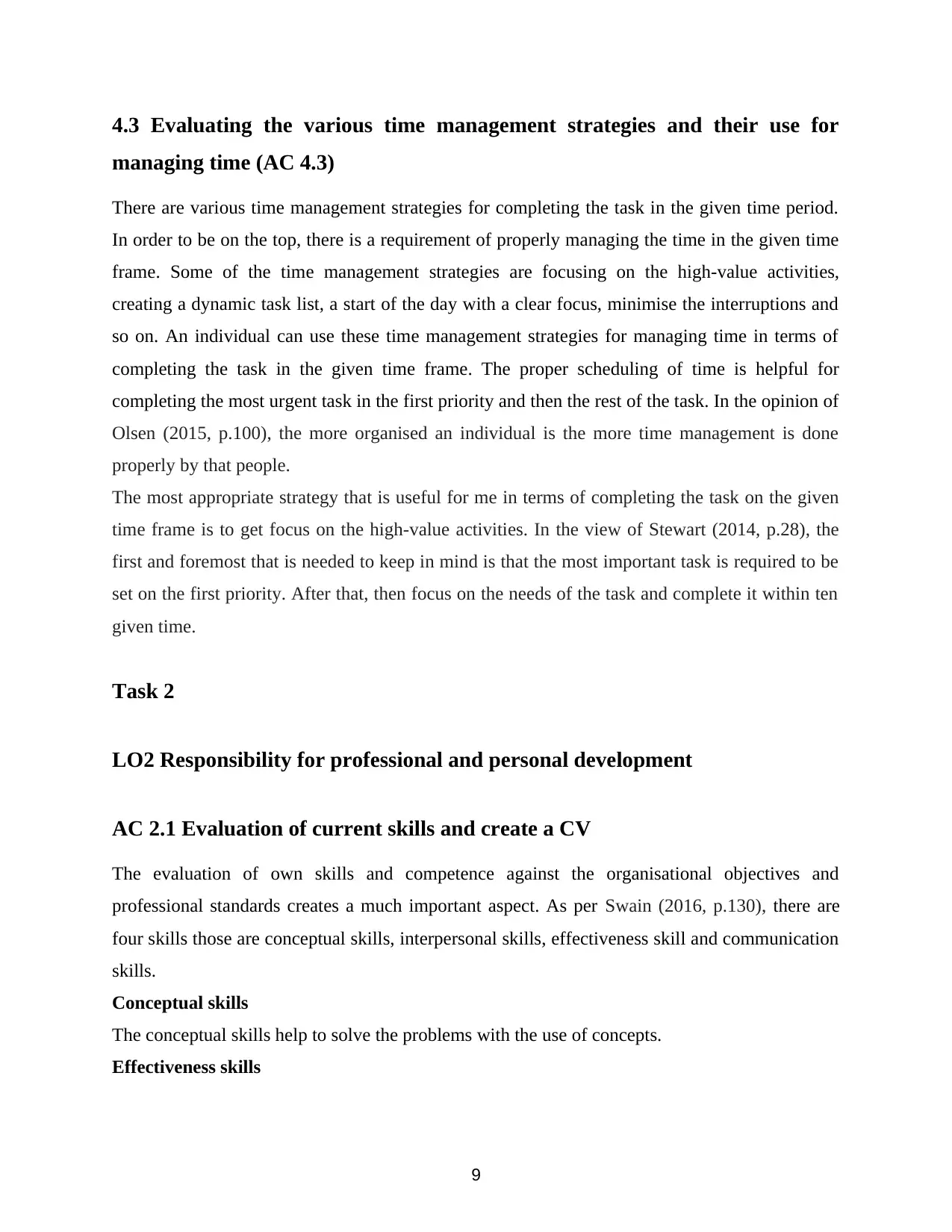
4.3 Evaluating the various time management strategies and their use for
managing time (AC 4.3)
There are various time management strategies for completing the task in the given time period.
In order to be on the top, there is a requirement of properly managing the time in the given time
frame. Some of the time management strategies are focusing on the high-value activities,
creating a dynamic task list, a start of the day with a clear focus, minimise the interruptions and
so on. An individual can use these time management strategies for managing time in terms of
completing the task in the given time frame. The proper scheduling of time is helpful for
completing the most urgent task in the first priority and then the rest of the task. In the opinion of
Olsen (2015, p.100), the more organised an individual is the more time management is done
properly by that people.
The most appropriate strategy that is useful for me in terms of completing the task on the given
time frame is to get focus on the high-value activities. In the view of Stewart (2014, p.28), the
first and foremost that is needed to keep in mind is that the most important task is required to be
set on the first priority. After that, then focus on the needs of the task and complete it within ten
given time.
Task 2
LO2 Responsibility for professional and personal development
AC 2.1 Evaluation of current skills and create a CV
The evaluation of own skills and competence against the organisational objectives and
professional standards creates a much important aspect. As per Swain (2016, p.130), there are
four skills those are conceptual skills, interpersonal skills, effectiveness skill and communication
skills.
Conceptual skills
The conceptual skills help to solve the problems with the use of concepts.
Effectiveness skills
9
managing time (AC 4.3)
There are various time management strategies for completing the task in the given time period.
In order to be on the top, there is a requirement of properly managing the time in the given time
frame. Some of the time management strategies are focusing on the high-value activities,
creating a dynamic task list, a start of the day with a clear focus, minimise the interruptions and
so on. An individual can use these time management strategies for managing time in terms of
completing the task in the given time frame. The proper scheduling of time is helpful for
completing the most urgent task in the first priority and then the rest of the task. In the opinion of
Olsen (2015, p.100), the more organised an individual is the more time management is done
properly by that people.
The most appropriate strategy that is useful for me in terms of completing the task on the given
time frame is to get focus on the high-value activities. In the view of Stewart (2014, p.28), the
first and foremost that is needed to keep in mind is that the most important task is required to be
set on the first priority. After that, then focus on the needs of the task and complete it within ten
given time.
Task 2
LO2 Responsibility for professional and personal development
AC 2.1 Evaluation of current skills and create a CV
The evaluation of own skills and competence against the organisational objectives and
professional standards creates a much important aspect. As per Swain (2016, p.130), there are
four skills those are conceptual skills, interpersonal skills, effectiveness skill and communication
skills.
Conceptual skills
The conceptual skills help to solve the problems with the use of concepts.
Effectiveness skills
9
Secure Best Marks with AI Grader
Need help grading? Try our AI Grader for instant feedback on your assignments.
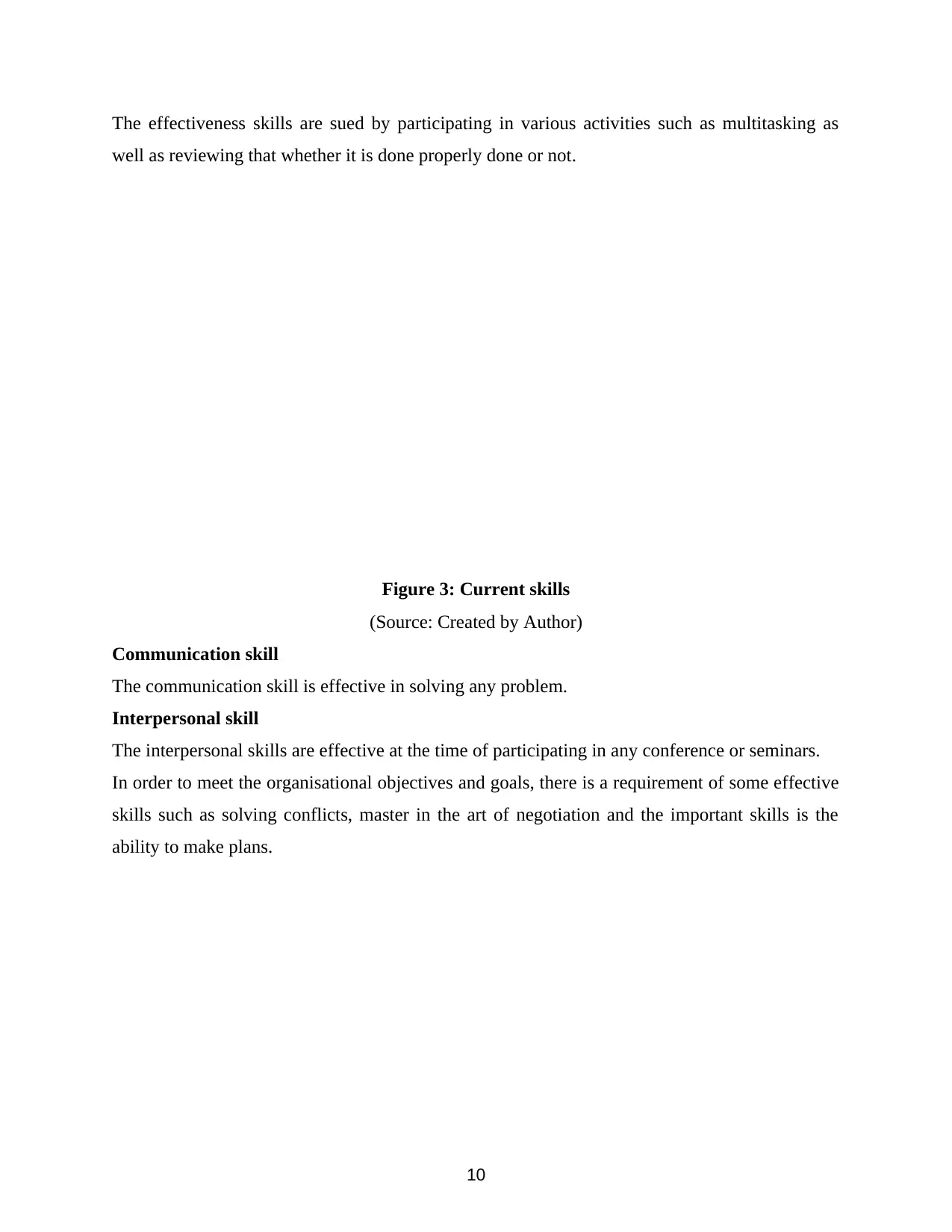
The effectiveness skills are sued by participating in various activities such as multitasking as
well as reviewing that whether it is done properly done or not.
Figure 3: Current skills
(Source: Created by Author)
Communication skill
The communication skill is effective in solving any problem.
Interpersonal skill
The interpersonal skills are effective at the time of participating in any conference or seminars.
In order to meet the organisational objectives and goals, there is a requirement of some effective
skills such as solving conflicts, master in the art of negotiation and the important skills is the
ability to make plans.
10
well as reviewing that whether it is done properly done or not.
Figure 3: Current skills
(Source: Created by Author)
Communication skill
The communication skill is effective in solving any problem.
Interpersonal skill
The interpersonal skills are effective at the time of participating in any conference or seminars.
In order to meet the organisational objectives and goals, there is a requirement of some effective
skills such as solving conflicts, master in the art of negotiation and the important skills is the
ability to make plans.
10
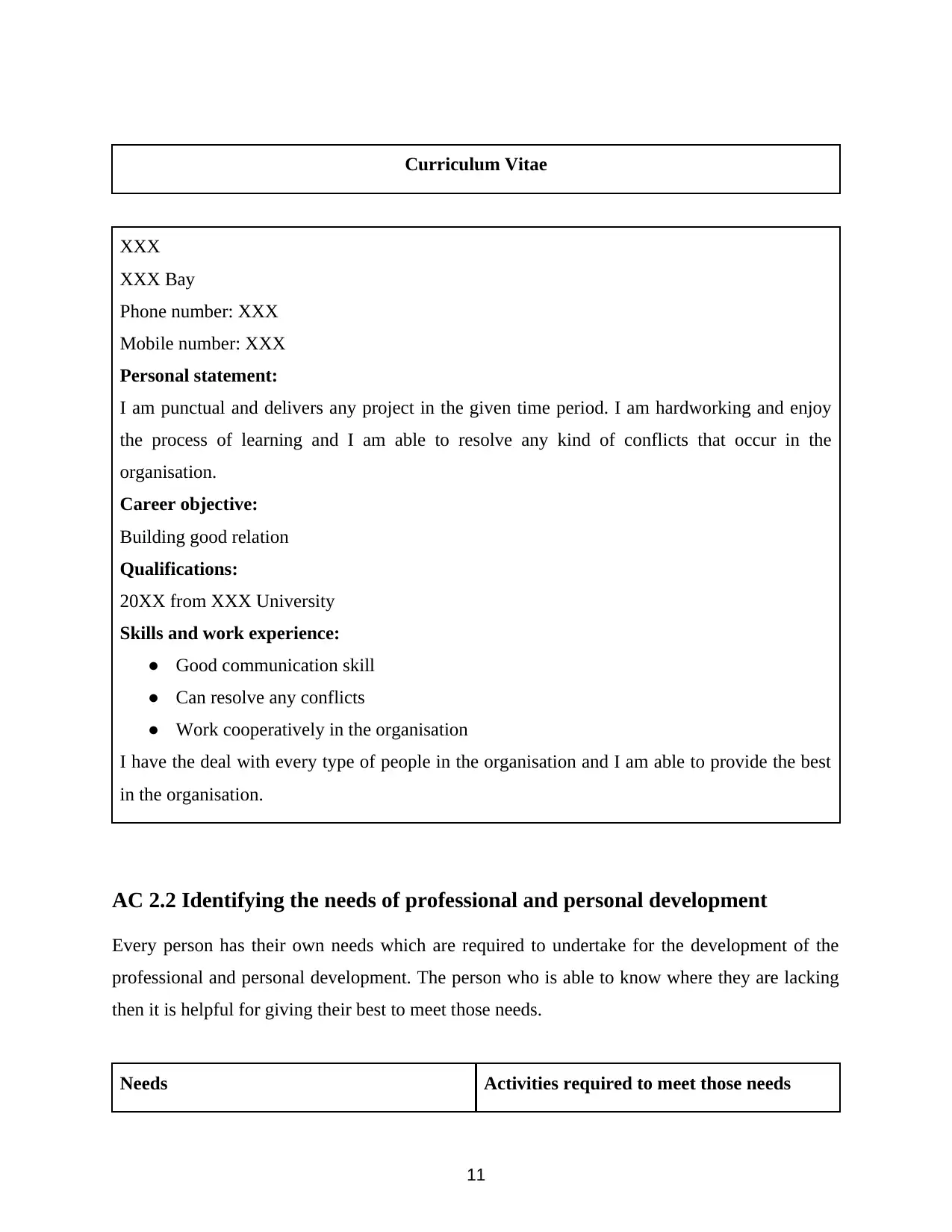
Curriculum Vitae
XXX
XXX Bay
Phone number: XXX
Mobile number: XXX
Personal statement:
I am punctual and delivers any project in the given time period. I am hardworking and enjoy
the process of learning and I am able to resolve any kind of conflicts that occur in the
organisation.
Career objective:
Building good relation
Qualifications:
20XX from XXX University
Skills and work experience:
● Good communication skill
● Can resolve any conflicts
● Work cooperatively in the organisation
I have the deal with every type of people in the organisation and I am able to provide the best
in the organisation.
AC 2.2 Identifying the needs of professional and personal development
Every person has their own needs which are required to undertake for the development of the
professional and personal development. The person who is able to know where they are lacking
then it is helpful for giving their best to meet those needs.
Needs Activities required to meet those needs
11
XXX
XXX Bay
Phone number: XXX
Mobile number: XXX
Personal statement:
I am punctual and delivers any project in the given time period. I am hardworking and enjoy
the process of learning and I am able to resolve any kind of conflicts that occur in the
organisation.
Career objective:
Building good relation
Qualifications:
20XX from XXX University
Skills and work experience:
● Good communication skill
● Can resolve any conflicts
● Work cooperatively in the organisation
I have the deal with every type of people in the organisation and I am able to provide the best
in the organisation.
AC 2.2 Identifying the needs of professional and personal development
Every person has their own needs which are required to undertake for the development of the
professional and personal development. The person who is able to know where they are lacking
then it is helpful for giving their best to meet those needs.
Needs Activities required to meet those needs
11
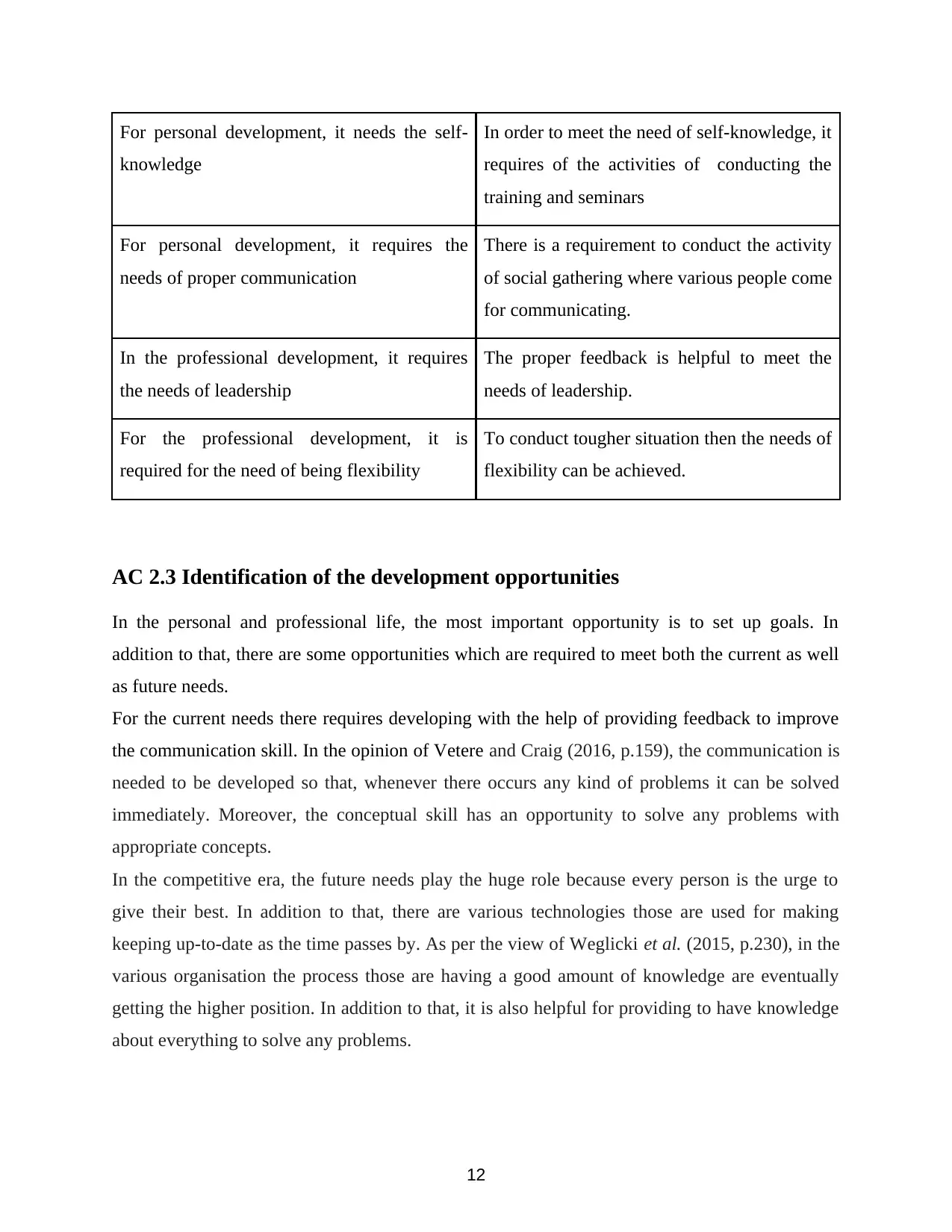
For personal development, it needs the self-
knowledge
In order to meet the need of self-knowledge, it
requires of the activities of conducting the
training and seminars
For personal development, it requires the
needs of proper communication
There is a requirement to conduct the activity
of social gathering where various people come
for communicating.
In the professional development, it requires
the needs of leadership
The proper feedback is helpful to meet the
needs of leadership.
For the professional development, it is
required for the need of being flexibility
To conduct tougher situation then the needs of
flexibility can be achieved.
AC 2.3 Identification of the development opportunities
In the personal and professional life, the most important opportunity is to set up goals. In
addition to that, there are some opportunities which are required to meet both the current as well
as future needs.
For the current needs there requires developing with the help of providing feedback to improve
the communication skill. In the opinion of Vetere and Craig (2016, p.159), the communication is
needed to be developed so that, whenever there occurs any kind of problems it can be solved
immediately. Moreover, the conceptual skill has an opportunity to solve any problems with
appropriate concepts.
In the competitive era, the future needs play the huge role because every person is the urge to
give their best. In addition to that, there are various technologies those are used for making
keeping up-to-date as the time passes by. As per the view of Weglicki et al. (2015, p.230), in the
various organisation the process those are having a good amount of knowledge are eventually
getting the higher position. In addition to that, it is also helpful for providing to have knowledge
about everything to solve any problems.
12
knowledge
In order to meet the need of self-knowledge, it
requires of the activities of conducting the
training and seminars
For personal development, it requires the
needs of proper communication
There is a requirement to conduct the activity
of social gathering where various people come
for communicating.
In the professional development, it requires
the needs of leadership
The proper feedback is helpful to meet the
needs of leadership.
For the professional development, it is
required for the need of being flexibility
To conduct tougher situation then the needs of
flexibility can be achieved.
AC 2.3 Identification of the development opportunities
In the personal and professional life, the most important opportunity is to set up goals. In
addition to that, there are some opportunities which are required to meet both the current as well
as future needs.
For the current needs there requires developing with the help of providing feedback to improve
the communication skill. In the opinion of Vetere and Craig (2016, p.159), the communication is
needed to be developed so that, whenever there occurs any kind of problems it can be solved
immediately. Moreover, the conceptual skill has an opportunity to solve any problems with
appropriate concepts.
In the competitive era, the future needs play the huge role because every person is the urge to
give their best. In addition to that, there are various technologies those are used for making
keeping up-to-date as the time passes by. As per the view of Weglicki et al. (2015, p.230), in the
various organisation the process those are having a good amount of knowledge are eventually
getting the higher position. In addition to that, it is also helpful for providing to have knowledge
about everything to solve any problems.
12
Paraphrase This Document
Need a fresh take? Get an instant paraphrase of this document with our AI Paraphraser
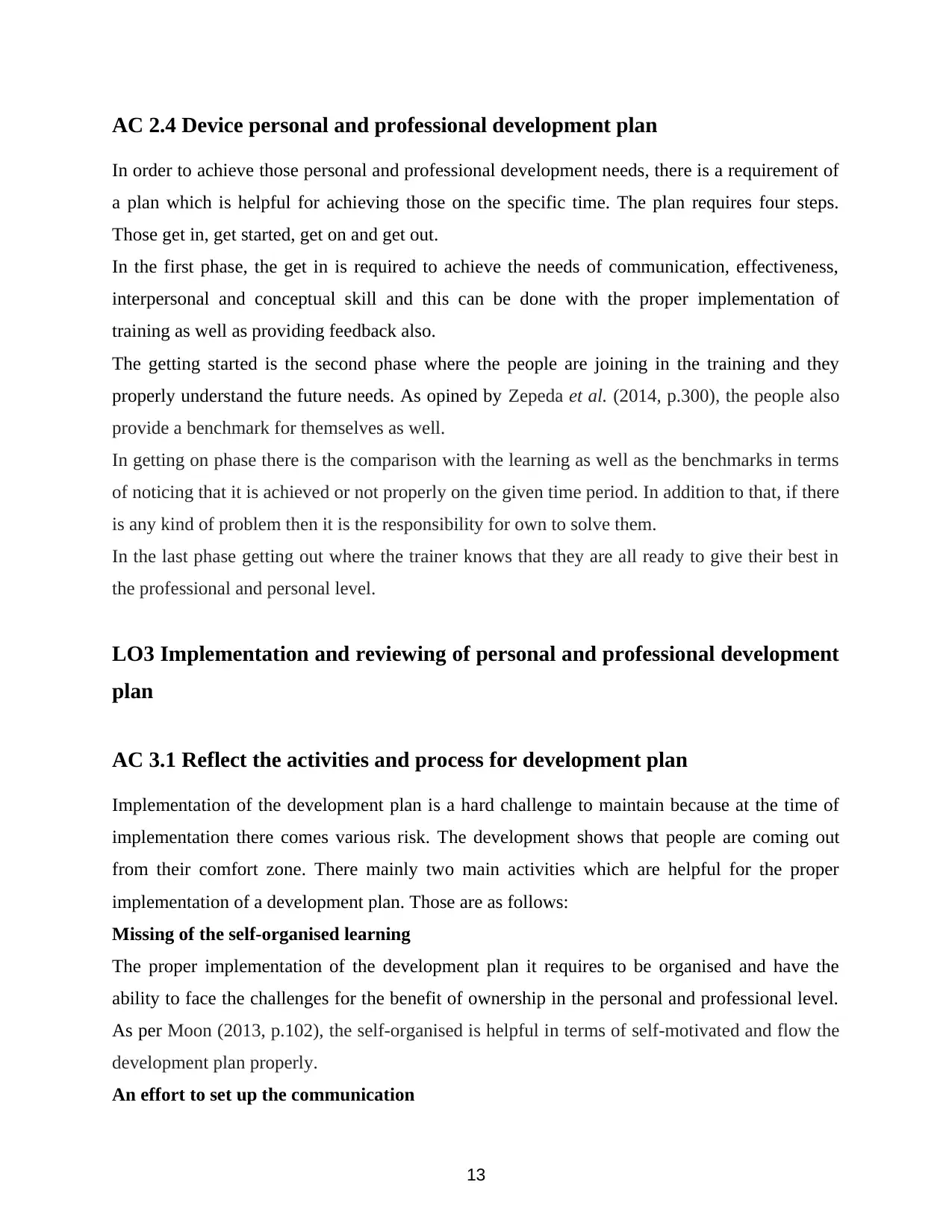
AC 2.4 Device personal and professional development plan
In order to achieve those personal and professional development needs, there is a requirement of
a plan which is helpful for achieving those on the specific time. The plan requires four steps.
Those get in, get started, get on and get out.
In the first phase, the get in is required to achieve the needs of communication, effectiveness,
interpersonal and conceptual skill and this can be done with the proper implementation of
training as well as providing feedback also.
The getting started is the second phase where the people are joining in the training and they
properly understand the future needs. As opined by Zepeda et al. (2014, p.300), the people also
provide a benchmark for themselves as well.
In getting on phase there is the comparison with the learning as well as the benchmarks in terms
of noticing that it is achieved or not properly on the given time period. In addition to that, if there
is any kind of problem then it is the responsibility for own to solve them.
In the last phase getting out where the trainer knows that they are all ready to give their best in
the professional and personal level.
LO3 Implementation and reviewing of personal and professional development
plan
AC 3.1 Reflect the activities and process for development plan
Implementation of the development plan is a hard challenge to maintain because at the time of
implementation there comes various risk. The development shows that people are coming out
from their comfort zone. There mainly two main activities which are helpful for the proper
implementation of a development plan. Those are as follows:
Missing of the self-organised learning
The proper implementation of the development plan it requires to be organised and have the
ability to face the challenges for the benefit of ownership in the personal and professional level.
As per Moon (2013, p.102), the self-organised is helpful in terms of self-motivated and flow the
development plan properly.
An effort to set up the communication
13
In order to achieve those personal and professional development needs, there is a requirement of
a plan which is helpful for achieving those on the specific time. The plan requires four steps.
Those get in, get started, get on and get out.
In the first phase, the get in is required to achieve the needs of communication, effectiveness,
interpersonal and conceptual skill and this can be done with the proper implementation of
training as well as providing feedback also.
The getting started is the second phase where the people are joining in the training and they
properly understand the future needs. As opined by Zepeda et al. (2014, p.300), the people also
provide a benchmark for themselves as well.
In getting on phase there is the comparison with the learning as well as the benchmarks in terms
of noticing that it is achieved or not properly on the given time period. In addition to that, if there
is any kind of problem then it is the responsibility for own to solve them.
In the last phase getting out where the trainer knows that they are all ready to give their best in
the professional and personal level.
LO3 Implementation and reviewing of personal and professional development
plan
AC 3.1 Reflect the activities and process for development plan
Implementation of the development plan is a hard challenge to maintain because at the time of
implementation there comes various risk. The development shows that people are coming out
from their comfort zone. There mainly two main activities which are helpful for the proper
implementation of a development plan. Those are as follows:
Missing of the self-organised learning
The proper implementation of the development plan it requires to be organised and have the
ability to face the challenges for the benefit of ownership in the personal and professional level.
As per Moon (2013, p.102), the self-organised is helpful in terms of self-motivated and flow the
development plan properly.
An effort to set up the communication
13
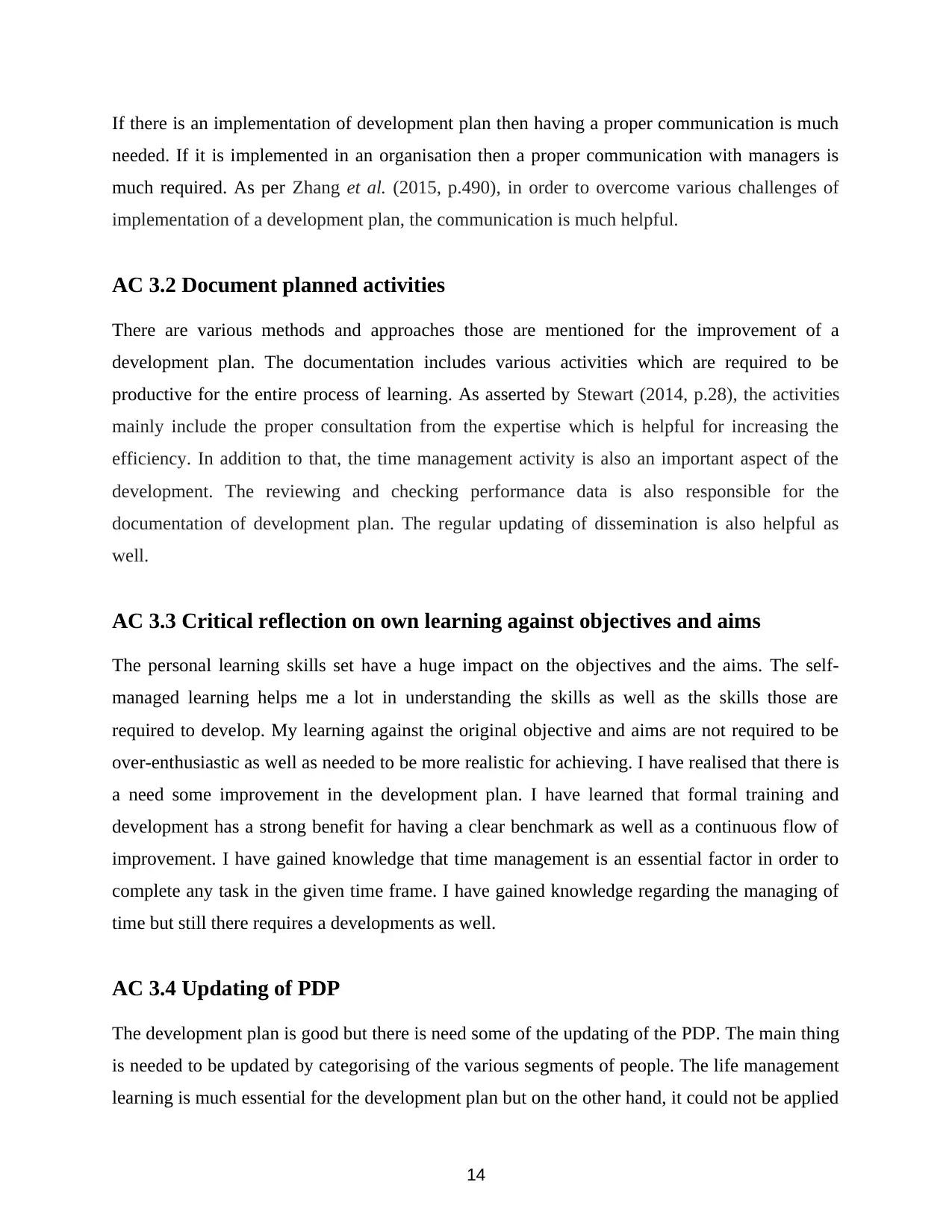
If there is an implementation of development plan then having a proper communication is much
needed. If it is implemented in an organisation then a proper communication with managers is
much required. As per Zhang et al. (2015, p.490), in order to overcome various challenges of
implementation of a development plan, the communication is much helpful.
AC 3.2 Document planned activities
There are various methods and approaches those are mentioned for the improvement of a
development plan. The documentation includes various activities which are required to be
productive for the entire process of learning. As asserted by Stewart (2014, p.28), the activities
mainly include the proper consultation from the expertise which is helpful for increasing the
efficiency. In addition to that, the time management activity is also an important aspect of the
development. The reviewing and checking performance data is also responsible for the
documentation of development plan. The regular updating of dissemination is also helpful as
well.
AC 3.3 Critical reflection on own learning against objectives and aims
The personal learning skills set have a huge impact on the objectives and the aims. The self-
managed learning helps me a lot in understanding the skills as well as the skills those are
required to develop. My learning against the original objective and aims are not required to be
over-enthusiastic as well as needed to be more realistic for achieving. I have realised that there is
a need some improvement in the development plan. I have learned that formal training and
development has a strong benefit for having a clear benchmark as well as a continuous flow of
improvement. I have gained knowledge that time management is an essential factor in order to
complete any task in the given time frame. I have gained knowledge regarding the managing of
time but still there requires a developments as well.
AC 3.4 Updating of PDP
The development plan is good but there is need some of the updating of the PDP. The main thing
is needed to be updated by categorising of the various segments of people. The life management
learning is much essential for the development plan but on the other hand, it could not be applied
14
needed. If it is implemented in an organisation then a proper communication with managers is
much required. As per Zhang et al. (2015, p.490), in order to overcome various challenges of
implementation of a development plan, the communication is much helpful.
AC 3.2 Document planned activities
There are various methods and approaches those are mentioned for the improvement of a
development plan. The documentation includes various activities which are required to be
productive for the entire process of learning. As asserted by Stewart (2014, p.28), the activities
mainly include the proper consultation from the expertise which is helpful for increasing the
efficiency. In addition to that, the time management activity is also an important aspect of the
development. The reviewing and checking performance data is also responsible for the
documentation of development plan. The regular updating of dissemination is also helpful as
well.
AC 3.3 Critical reflection on own learning against objectives and aims
The personal learning skills set have a huge impact on the objectives and the aims. The self-
managed learning helps me a lot in understanding the skills as well as the skills those are
required to develop. My learning against the original objective and aims are not required to be
over-enthusiastic as well as needed to be more realistic for achieving. I have realised that there is
a need some improvement in the development plan. I have learned that formal training and
development has a strong benefit for having a clear benchmark as well as a continuous flow of
improvement. I have gained knowledge that time management is an essential factor in order to
complete any task in the given time frame. I have gained knowledge regarding the managing of
time but still there requires a developments as well.
AC 3.4 Updating of PDP
The development plan is good but there is need some of the updating of the PDP. The main thing
is needed to be updated by categorising of the various segments of people. The life management
learning is much essential for the development plan but on the other hand, it could not be applied
14
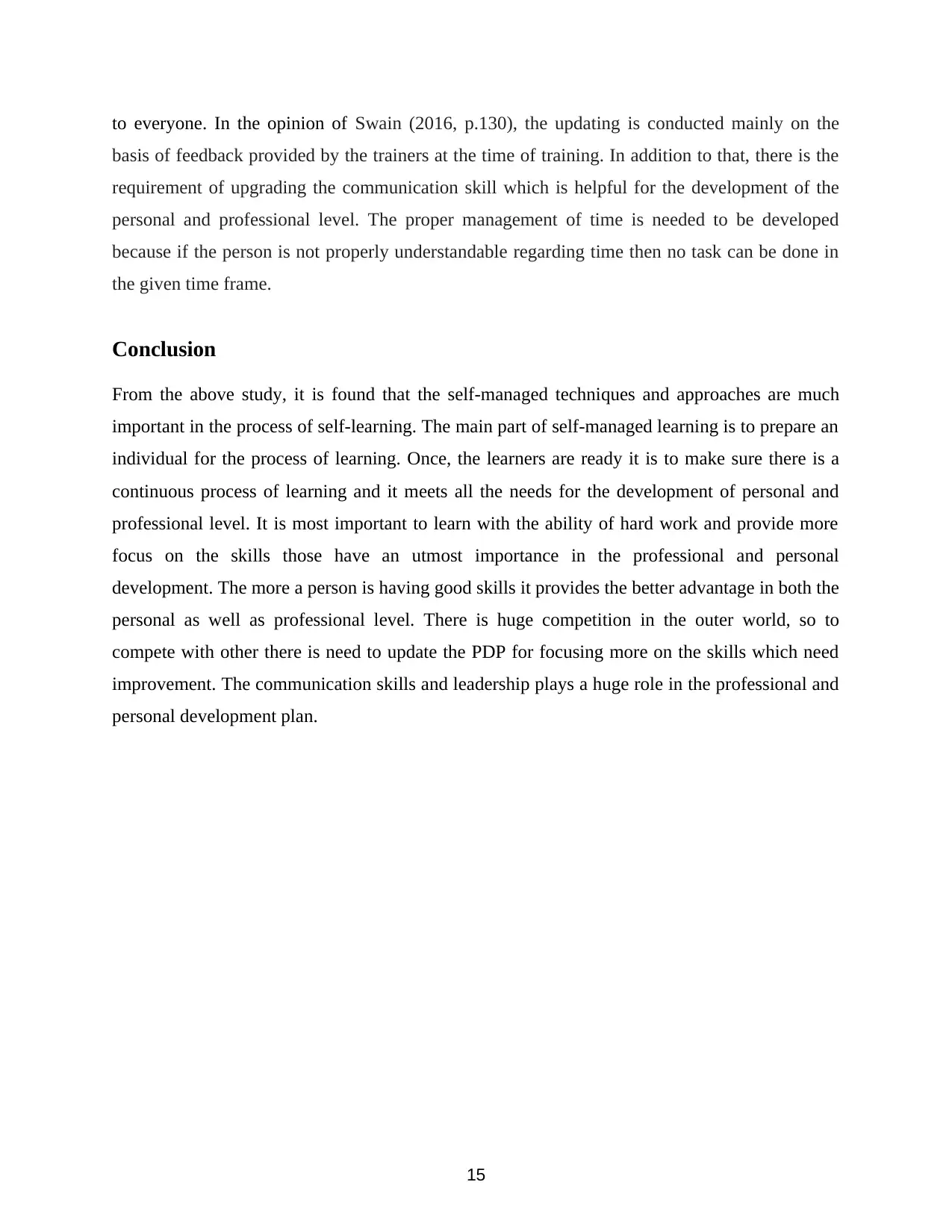
to everyone. In the opinion of Swain (2016, p.130), the updating is conducted mainly on the
basis of feedback provided by the trainers at the time of training. In addition to that, there is the
requirement of upgrading the communication skill which is helpful for the development of the
personal and professional level. The proper management of time is needed to be developed
because if the person is not properly understandable regarding time then no task can be done in
the given time frame.
Conclusion
From the above study, it is found that the self-managed techniques and approaches are much
important in the process of self-learning. The main part of self-managed learning is to prepare an
individual for the process of learning. Once, the learners are ready it is to make sure there is a
continuous process of learning and it meets all the needs for the development of personal and
professional level. It is most important to learn with the ability of hard work and provide more
focus on the skills those have an utmost importance in the professional and personal
development. The more a person is having good skills it provides the better advantage in both the
personal as well as professional level. There is huge competition in the outer world, so to
compete with other there is need to update the PDP for focusing more on the skills which need
improvement. The communication skills and leadership plays a huge role in the professional and
personal development plan.
15
basis of feedback provided by the trainers at the time of training. In addition to that, there is the
requirement of upgrading the communication skill which is helpful for the development of the
personal and professional level. The proper management of time is needed to be developed
because if the person is not properly understandable regarding time then no task can be done in
the given time frame.
Conclusion
From the above study, it is found that the self-managed techniques and approaches are much
important in the process of self-learning. The main part of self-managed learning is to prepare an
individual for the process of learning. Once, the learners are ready it is to make sure there is a
continuous process of learning and it meets all the needs for the development of personal and
professional level. It is most important to learn with the ability of hard work and provide more
focus on the skills those have an utmost importance in the professional and personal
development. The more a person is having good skills it provides the better advantage in both the
personal as well as professional level. There is huge competition in the outer world, so to
compete with other there is need to update the PDP for focusing more on the skills which need
improvement. The communication skills and leadership plays a huge role in the professional and
personal development plan.
15
Secure Best Marks with AI Grader
Need help grading? Try our AI Grader for instant feedback on your assignments.
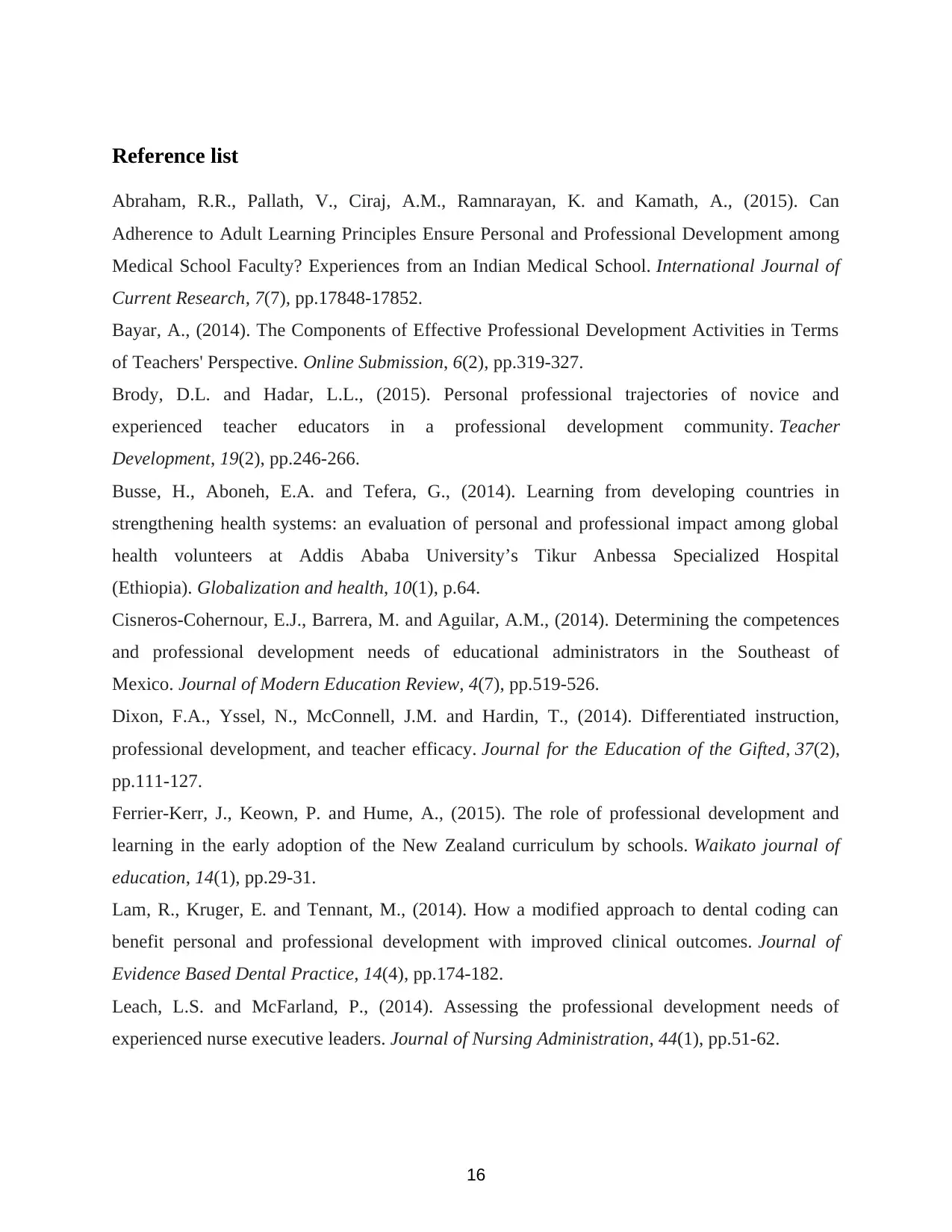
Reference list
Abraham, R.R., Pallath, V., Ciraj, A.M., Ramnarayan, K. and Kamath, A., (2015). Can
Adherence to Adult Learning Principles Ensure Personal and Professional Development among
Medical School Faculty? Experiences from an Indian Medical School. International Journal of
Current Research, 7(7), pp.17848-17852.
Bayar, A., (2014). The Components of Effective Professional Development Activities in Terms
of Teachers' Perspective. Online Submission, 6(2), pp.319-327.
Brody, D.L. and Hadar, L.L., (2015). Personal professional trajectories of novice and
experienced teacher educators in a professional development community. Teacher
Development, 19(2), pp.246-266.
Busse, H., Aboneh, E.A. and Tefera, G., (2014). Learning from developing countries in
strengthening health systems: an evaluation of personal and professional impact among global
health volunteers at Addis Ababa University’s Tikur Anbessa Specialized Hospital
(Ethiopia). Globalization and health, 10(1), p.64.
Cisneros-Cohernour, E.J., Barrera, M. and Aguilar, A.M., (2014). Determining the competences
and professional development needs of educational administrators in the Southeast of
Mexico. Journal of Modern Education Review, 4(7), pp.519-526.
Dixon, F.A., Yssel, N., McConnell, J.M. and Hardin, T., (2014). Differentiated instruction,
professional development, and teacher efficacy. Journal for the Education of the Gifted, 37(2),
pp.111-127.
Ferrier-Kerr, J., Keown, P. and Hume, A., (2015). The role of professional development and
learning in the early adoption of the New Zealand curriculum by schools. Waikato journal of
education, 14(1), pp.29-31.
Lam, R., Kruger, E. and Tennant, M., (2014). How a modified approach to dental coding can
benefit personal and professional development with improved clinical outcomes. Journal of
Evidence Based Dental Practice, 14(4), pp.174-182.
Leach, L.S. and McFarland, P., (2014). Assessing the professional development needs of
experienced nurse executive leaders. Journal of Nursing Administration, 44(1), pp.51-62.
16
Abraham, R.R., Pallath, V., Ciraj, A.M., Ramnarayan, K. and Kamath, A., (2015). Can
Adherence to Adult Learning Principles Ensure Personal and Professional Development among
Medical School Faculty? Experiences from an Indian Medical School. International Journal of
Current Research, 7(7), pp.17848-17852.
Bayar, A., (2014). The Components of Effective Professional Development Activities in Terms
of Teachers' Perspective. Online Submission, 6(2), pp.319-327.
Brody, D.L. and Hadar, L.L., (2015). Personal professional trajectories of novice and
experienced teacher educators in a professional development community. Teacher
Development, 19(2), pp.246-266.
Busse, H., Aboneh, E.A. and Tefera, G., (2014). Learning from developing countries in
strengthening health systems: an evaluation of personal and professional impact among global
health volunteers at Addis Ababa University’s Tikur Anbessa Specialized Hospital
(Ethiopia). Globalization and health, 10(1), p.64.
Cisneros-Cohernour, E.J., Barrera, M. and Aguilar, A.M., (2014). Determining the competences
and professional development needs of educational administrators in the Southeast of
Mexico. Journal of Modern Education Review, 4(7), pp.519-526.
Dixon, F.A., Yssel, N., McConnell, J.M. and Hardin, T., (2014). Differentiated instruction,
professional development, and teacher efficacy. Journal for the Education of the Gifted, 37(2),
pp.111-127.
Ferrier-Kerr, J., Keown, P. and Hume, A., (2015). The role of professional development and
learning in the early adoption of the New Zealand curriculum by schools. Waikato journal of
education, 14(1), pp.29-31.
Lam, R., Kruger, E. and Tennant, M., (2014). How a modified approach to dental coding can
benefit personal and professional development with improved clinical outcomes. Journal of
Evidence Based Dental Practice, 14(4), pp.174-182.
Leach, L.S. and McFarland, P., (2014). Assessing the professional development needs of
experienced nurse executive leaders. Journal of Nursing Administration, 44(1), pp.51-62.
16
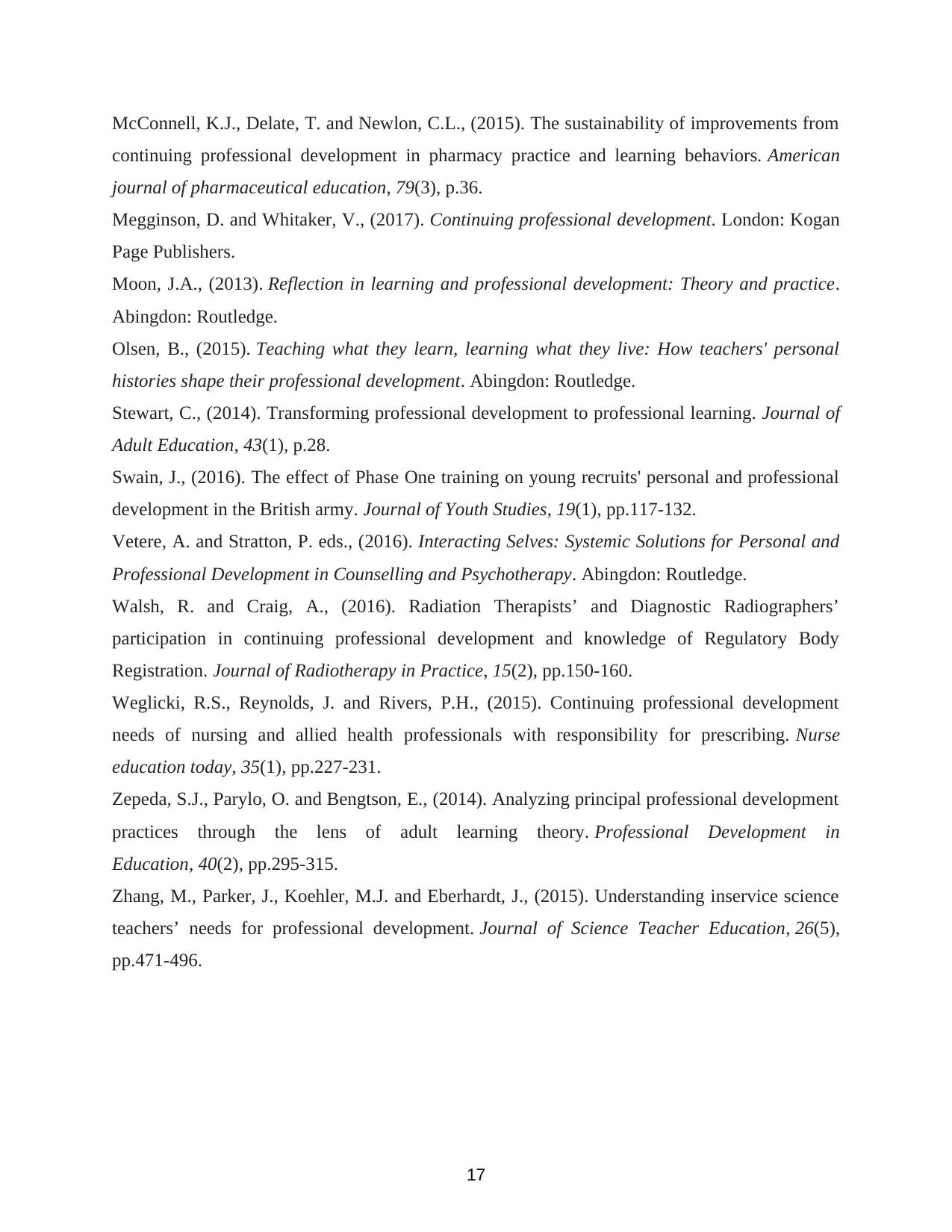
McConnell, K.J., Delate, T. and Newlon, C.L., (2015). The sustainability of improvements from
continuing professional development in pharmacy practice and learning behaviors. American
journal of pharmaceutical education, 79(3), p.36.
Megginson, D. and Whitaker, V., (2017). Continuing professional development. London: Kogan
Page Publishers.
Moon, J.A., (2013). Reflection in learning and professional development: Theory and practice.
Abingdon: Routledge.
Olsen, B., (2015). Teaching what they learn, learning what they live: How teachers' personal
histories shape their professional development. Abingdon: Routledge.
Stewart, C., (2014). Transforming professional development to professional learning. Journal of
Adult Education, 43(1), p.28.
Swain, J., (2016). The effect of Phase One training on young recruits' personal and professional
development in the British army. Journal of Youth Studies, 19(1), pp.117-132.
Vetere, A. and Stratton, P. eds., (2016). Interacting Selves: Systemic Solutions for Personal and
Professional Development in Counselling and Psychotherapy. Abingdon: Routledge.
Walsh, R. and Craig, A., (2016). Radiation Therapists’ and Diagnostic Radiographers’
participation in continuing professional development and knowledge of Regulatory Body
Registration. Journal of Radiotherapy in Practice, 15(2), pp.150-160.
Weglicki, R.S., Reynolds, J. and Rivers, P.H., (2015). Continuing professional development
needs of nursing and allied health professionals with responsibility for prescribing. Nurse
education today, 35(1), pp.227-231.
Zepeda, S.J., Parylo, O. and Bengtson, E., (2014). Analyzing principal professional development
practices through the lens of adult learning theory. Professional Development in
Education, 40(2), pp.295-315.
Zhang, M., Parker, J., Koehler, M.J. and Eberhardt, J., (2015). Understanding inservice science
teachers’ needs for professional development. Journal of Science Teacher Education, 26(5),
pp.471-496.
17
continuing professional development in pharmacy practice and learning behaviors. American
journal of pharmaceutical education, 79(3), p.36.
Megginson, D. and Whitaker, V., (2017). Continuing professional development. London: Kogan
Page Publishers.
Moon, J.A., (2013). Reflection in learning and professional development: Theory and practice.
Abingdon: Routledge.
Olsen, B., (2015). Teaching what they learn, learning what they live: How teachers' personal
histories shape their professional development. Abingdon: Routledge.
Stewart, C., (2014). Transforming professional development to professional learning. Journal of
Adult Education, 43(1), p.28.
Swain, J., (2016). The effect of Phase One training on young recruits' personal and professional
development in the British army. Journal of Youth Studies, 19(1), pp.117-132.
Vetere, A. and Stratton, P. eds., (2016). Interacting Selves: Systemic Solutions for Personal and
Professional Development in Counselling and Psychotherapy. Abingdon: Routledge.
Walsh, R. and Craig, A., (2016). Radiation Therapists’ and Diagnostic Radiographers’
participation in continuing professional development and knowledge of Regulatory Body
Registration. Journal of Radiotherapy in Practice, 15(2), pp.150-160.
Weglicki, R.S., Reynolds, J. and Rivers, P.H., (2015). Continuing professional development
needs of nursing and allied health professionals with responsibility for prescribing. Nurse
education today, 35(1), pp.227-231.
Zepeda, S.J., Parylo, O. and Bengtson, E., (2014). Analyzing principal professional development
practices through the lens of adult learning theory. Professional Development in
Education, 40(2), pp.295-315.
Zhang, M., Parker, J., Koehler, M.J. and Eberhardt, J., (2015). Understanding inservice science
teachers’ needs for professional development. Journal of Science Teacher Education, 26(5),
pp.471-496.
17
1 out of 18
Related Documents
Your All-in-One AI-Powered Toolkit for Academic Success.
+13062052269
info@desklib.com
Available 24*7 on WhatsApp / Email
![[object Object]](/_next/static/media/star-bottom.7253800d.svg)
Unlock your academic potential
© 2024 | Zucol Services PVT LTD | All rights reserved.





